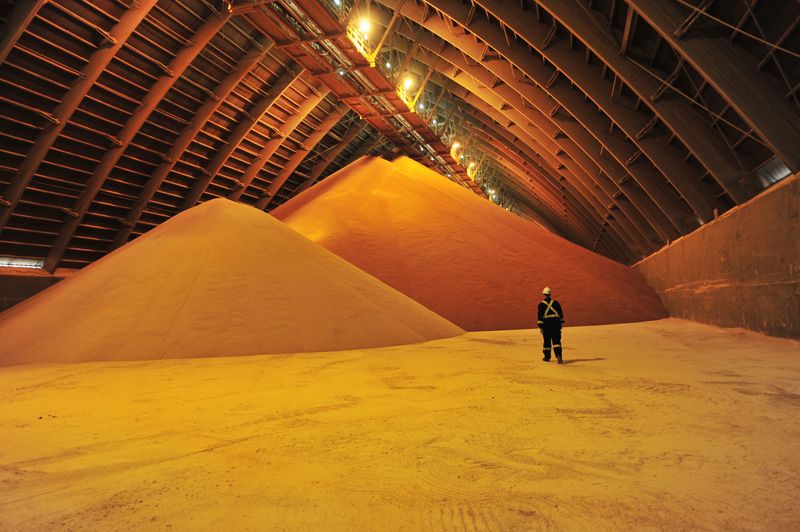Investing.com’s stocks of the week
By Ana Mano
SAO PAULO (Reuters) -Nutrien Ltd., the world's largest producer of potash fertilizer, is mulling divestments in South America, replacing management and halting an acquisition spree in Brazil after steep losses in the region, according to sources with direct knowledge of the matter.
Nutrien (NYSE:NTR) this year separated Brazil from the rest of its Latin American operations as it mulls the sale of Argentina, Chile and Uruguay assets in order to streamline operations in the region, two sources said. Since April 2023, at least eight senior executives or managers were fired or quit the company, including Brazil's entire supply management team, and the former Latin America CEO and CFO, according to three sources, who spoke on condition of anonymity because details of the changes have not been publicly announced.
The company's shares rose to the day's high of C$74.33, up 2.2% following the Reuters story.
Nutrien's troubles in South America come as fertilizer companies struggled with market volatility globally since Russia's invasion of Ukraine sent prices skyrocketing in 2022 only to collapse the following year as farmers held off on purchases and global supplies stabilized.
The job cuts and potential asset sales stem from the challenges Nutrien faced cracking the farm retail market in Brazil, where it introduced a unique business model.
Nutrien last year recognized a $465 million impairment related to its South American acquisitions, which Morningstar analyst Seth Goldstein said was due to the lower value of its fertilizer inventory.
"As a new business, structural and leadership changes are part of the growth journey," Nutrien said in a statement to Reuters.
The company declined to comment on details of its plans, including potential divestments or staff changes.
RETAIL EXPANSION
Nutrien started its Brazilian expansion soon after its 2018 formation through the merger of Potash Corp of Saskatchewan and Agrium Inc, which had one small fertilizer maker in Sao Paulo state.
Nutrien initially planned to increase farm retail sales by as much as 30% in central and southern Brazil, mostly by buying existing dealers. International rivals including Mosaic and Yara had avoided direct sales to farmers in Brazil, a hugely fragmented market.
Andre Dias, who joined in 2019 as Brazil CEO and was later promoted to Latam CEO, announced some eight acquisitions in roughly three years, according company disclosures.
Under his leadership, Nutrien sold fertilizer and other farm inputs at the newly acquired dealers or "experience centers," which are renovated stores often in urban areas. It also decided to centralize inventories to lower working capital requirements.
But Nutrien retailers struggled to deliver orders on time due to software integration issues and difficulty managing farm input supplies, factors that alienated farmers, two of the sources said. Valuable relationships with local farmers were also lost after employee departures from the retailers Nutrien bought, according to one of the sources and Marcelo Mello, fertilizer director at agribusiness consultancy StoneX.
By 2022, Nutrien said it operated in 13 Brazilian states and had about 200 commercial units in Latin America.
Nutrien and other importers in Brazil also stockpiled fertilizers because they feared supply shortages after the threat of Western sanctions on large producers Russia and Belarus in 2022, three sources said. Chinese restrictions on exports to secure nutrients for its own crops compounded those supply fears.
In 2023, Nutrien's gross margins suffered as it sold its high-cost inventory at a loss in South America. Last year, Nutrien's global sales fell by 23% to $29 billion while net earnings slumped 83% to $1.28 billion.
Dias, the Latin America CEO, left the company in April 2023 and the region's CFO Luis Cerresi departed in December, according to their LinkedIn profiles. Nutrien had named new global CEO Ken Seitz in 2022. Cerresi declined to comment.
Nutrien immediately suspended all acquisitions in Brazil and halted construction of new fertilizer plants after Dias left, two sources said.
Dias disputed the notion that the company grew too fast in an emailed statement to Reuters, saying his work should not be judged by the volume of acquisitions, adding local competitors had made similar moves.
Nutrien continues to face a challenging environment in South America. The price of potash is low and will stay there as huge new projects emerge in Canada and England, StoneX's Mello said. That spells trouble for any company with inventory on hand that costs more than the current price.
"The entire industry in Brazil lost a lot of money last year," Mello said.
Nutrien is looking for partnerships to use more capacity at its blending plants in Brazil, currently around 50%, said two of the sources. That could mean producing fertilizers for third parties, one source said.
Nutrien said in its email to Reuters that its five blenders are operating below maximum capacity and it is making adjustments due to macroeconomic conditions.
($1 = 4.9756 reais)
